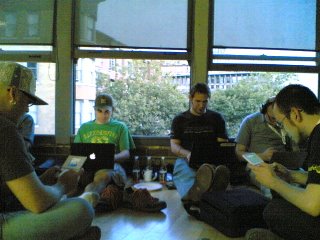“Ninety percent of everything is crud” – Sturgeon’s Revelation
With that principle in mind, I want to avoid burying all the things we hold dear (web 2.0, flickr, podcasting, bloggery, Darren Barefoot) just because 90% of them suck. If the suck rate was only 90%, we’d be doing great!
I want to get at the inherent flaws that are causing some of this stuff to achieve 3-5 nines of suck. Also, I should stop making up statistics.
Rethinking this after the first night of Bar Camp but before my presentation, I begin to doubt that things are really so dire, or that all these media and systems are such deadly dead ends. I want to say that most new (“web 2.0” for lack of a better geek-phrase) concepts are going to be subject to Sturgeon’s Revelation themselves, thus dooming virtually 100% of the content on 90% of the new media. But that’s another made-up statistic, and the popular media/services/ideas we are currently thinking about may already be the “good 10%”.
“PowerPoint style routinely disrupts, dominates, and trivializes content.”
PowerPoint is Evil – Edward R. Tufte
I’m worried about technologies that lead smart people to stupid outcomes: Powerpoint can make your presentation worse. Chartjunk destroys your visual graphics.
But I’m seeing some dangerous stuff in the stuff bloggers like, too: podcasting is a medium for making commentary slower, unsearchable, and less interactive.
“I demand four minutes and twenty seconds of your life” (the single finest podcast I have heard, and the blog has the greatest slogan of any. Transcript).
The hazards of podcasting are manifest, and the solution is simple: beware the medium. A better solution is to confine it to those circumstances where it is well-warranted, and tightly constrained. Audioscapes? Yes. Your music? Of course. Interviews? Usually no, or only
with transcripts.
But…hooray for podcasts, they give commuters something to do. Think hard: are there enough commuters to sustain your podcast? If they’re on transit, shouldn’t they be reading something instead of listening to audio?
Tagging text fragments: I think you can trust search.
Google: innovation has ceased, let the moribundity begin! But like Microsoft, it will take rather longer for market dominance to cease. And Google has probably got a pretty good handle on what is about to become the next big thing: Web Services for Everything (all your Base are belong to Google).
videocasting: see podcasting, but with a higher bandwidth load. bloggingheads.tv is a major criminal here, along with Cringely’s half-brilliant Nerd TV.
Since we have the inventor of the Dingalink at Bar Camp, here’s a closer reading of bloggingheads, what it does right and wrong:
- Enabling the ability to change the playback speed is a clever way to improve the “slower” problem.
- Robert Wright and Mickey Kaus’ bobbing heads are not a compelling use of bandwidth, though they seem to be there to improve one’s ability to tell who is talking during the “diavlog.”
- All hail the Dingalink, and the idea of segmenting the video into bite-sized (YouTube-sized?) chunks. It makes it easier to eat the bits you like, and ignore the morsels you don’t care for. Video smorgasbord!
- The video on the page is surrounded by text, links, and notes. It’s almost as if the creators know something more is needed…
- Where are the transcripts? The diavlog format is great for creating the conversations, but I wonder if its real fulfillment is to use the diavlogs as a means to the end of getting a (searchable!) transcript up.
Which leads us to Robert X. Cringely’s Nerd TV (note to Dingle: sorry, it doesn’t look like he uses machine-generated transcripts…after-midnight stupid idea: use machine transcripts as a starting point, and then wiki them to get your audience to edit out the mistakes! If they love you, they’ll do it gladly)
Half-brilliant? He has wonderful interviews with interesting subjects.
The transcripts are great, and usable. The video, featuring nothing but
an hour of a barely-moving head, has been a waste of bandwidth. I
stopped downloading anything but the 2-minute excerpts after episode
four.
But he also has those glorious transcripts, which give you the meat (and the flavour, and the searchability, and the speed) without the fat. Dieting should always be this easy!
When audio and video goes good: Penny Arcade, where the voices are, in some meaningful way, a raw performance (hm, this is fuzzy and stupid-sounding…). On-bike videos, and cyclocross videos, and the dog versus the Roomba. Actual music; Actual things happening on camera: should you be doing a podcast, or doing a blog that has video and audio “quotes”: short clips that enhance the mostly-text content?
Flickr right and wrong:
- It’s so much better than any other photo site out there it’s like crack for shutterbugs
- Little UI/workflow details that drive me nuts, and should be shaved down, optimized, refactored, fixed!
- Tags work here because despite the adages, most pictures need far less than a thousand words to classify their content effectively. And unlike video or audio, you can experience a picture in seconds. Note the holographic nature of the added data gathered from viewing a larger version of the same photo.
- Would flickr work as a video/audio/photo site? As a general content dump? I don’t know; just asking.
Ryan versus all phones and data plans ever:
In five years, everything I say on this subject will be moot. Stuff will have worked out. But right now, data in Canada is expensive, and is preventing many people from using content-gathering (or content-processing, or content-reading) phones as they should be used. Note to the PDA-phone and camera-phone makers of the world: fix the carriers so your phones will sell.
Google:
They may be in the land of diminishing returns (on their investments, on their revenues, on their new ideas per genius they hire, on the productivity gains they can get by improving the on-site meals…) but they can probably live there for a very long time. Will they become just another search-engine failure (Altavista, Askjeeves, Yahoo’s cataloguing project…), or stay on top? Will search matter in the future? Please give an example of an ultimate trivia question: one that cannot be easily Googled. Will link-farms and other evil SEO ultimately win over the forces of not-evil?
Blogs themselves: strive for expertise. Own a part of the long tail. The short body is largely consumed. Local blogging is mostly a crock: you can only live in one city, (and Metroblogging Vancouver has this turf! Or maybe it’s Beyond Robson…) but there are many topics you know a little about, and if you’re lucky, maybe there’s one topic you know enough about to sustain the interest of both writer and readers.
That said, if you want to blog about your cat, that’s not an abuse of the medium. I just expect higher goals of you Bar Camp-ers.
Thematic conclusions:
- Be a merciless critic of your own content and your own stuff.
- Be usable, accessible, searchable: don’t violate web-centric principles.
- Optimize. Refine. Keep shaving off the sharp corners, and most of all, the frictional barriers (reference “broken windows”) that keep your audience from doing what they want to do (and what we want them to do; it’s great when they’re the same thing)
- Change your medium to reflect the optimization. It’s a web 2.0, user-created, [buzzword-tech-buzzword; fill in later] world out there: you get to make it up, make it work, and make it better. Design is not just code, and maybe not even primarily code in some cases.
PS: if anyone can come up with a way of being cool in a hot medium, let me know. Controversy is a sad substitute for depth.

